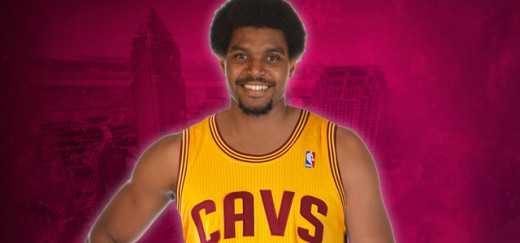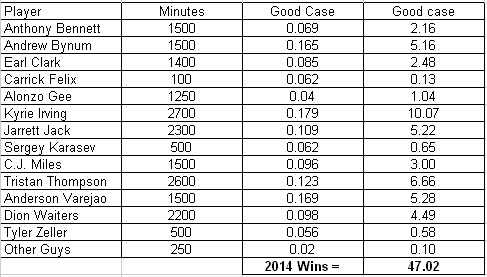Kevin’s Pseudo-Scientific 2013 – 2014 Projections, Part 2!!
2013-08-23The week began with an “unbiased” projection utilizing Win Shares for the 2013-2014 Cavaliers season. That is a fine disposition for a Monday, but heading towards the weekend, the sun shines brighter, skies are bluer; it’s time for a cheerier outlook than 41 wins.
Transitioning to a “good case” only took three adjustments. The end result with those modified Win Shares per 48 minutes and Win Shares is:
47 wins; battling for first round homecourt. Where do the extra wins come from?
- Kyrie plays 75 games, with per minute two-way effectiveness equal to Chris Paul’s age 21 season. Ambitiously hopeful? Yes. Possible? Also, yes. Obviously a healthful season featuring Kyrie continuing his ascension to the NBA’s upper echelon bodes well for the team’s bottom line. This requires continued slight improvements in offensive production, and a larger uptick in his, and the team’s, defensive play. This would be extremely awesome.
- Dion plays at league average. I trotted out variations of this a few times now, but from January through his March knee injury, in 33 games, he averaged 19.8 points per 36 minutes on 53.1% true shooting. League averages for shooting guards are 14 and 53.8, so he scored frequently but with nearly average efficiency. Look at Joe Johnson’s seven seasons as an offensive focal point in Atlanta. He bested both of those numbers in the same season twice. In one of his six All-Star seasons, he met neither of those thresholds. Like Waiters, he rebounded poorly and passed well. And Dion flashed that production for half a season at age 21. Johnson’s WS/48 at age 21 was 0.060, and descended to 0.048 in his age 22 season. Long story short, the second half of Waiters’s rookie season held promise. For Dion’s WS/48 in the scenario above, I averaged Eric Gordon, Ben Gordon, and OJ Mayo’s age-22 season; a handful of high-lottery, reasonably performing shooting guards. If Waiters’s off-ball offense and defense improve this year, last year definitely presented building blocks for a strong 2013 – 2014.
- Instead of 1000 minutes at 80% of pre-injury, Andrew Bynum plays 1500 minutes at 90% of his 2011-2012 production. The biggest player on the team ranks as the largest variable for the season. What, if anything, will he provide? While this take doesn’t reach “dream” scenario status, the equivalent of 50, 30-minute games from nearly vintage Bynum tips the scales towards “first round opponent no one wants to play” status.
While the third bullet is a complete unknown contingent on distressed knees, each of these outcomes is foreseeable. For the upcoming weekend, let’s focus on those; soon, a few equally reasonable “bad cases” will be explored.



If he keeps his weight in check, I think Bennett’s ceiling could be say 85% of Carmelo Anthony and won’t need to dominate the ball. They’re the same exact size, both allergic to defense, and both can score from anywhere.
Also, Zach Lowe wrote an excellent piece on why teams are now signing second rounders to long term contracts…basically, everyone is trying to find the next Chandler Parsons…an egregiously underpayed player. http://www.grantland.com/blog/the-triangle/post/_/id/71049/second-round-first-priority-ricky-ledo-and-exploiting-the-cbas-inefficiencies
I agree with one of the blogger comments to the article above:
“Bennett is like Paul Millsap on steroids. cavs are going to have the most loaded 2nd unit in the league. Bennett, Varejao, Jack, Gee/Miles/Karasev.”
Somewhat insightful article about Bennett’s potential:
http://bleacherreport.com/articles/1745492-best-and-worst-case-scenarios-for-anthony-bennetts-rookie-season-with-cleveland
Of course, I think his ceiling is higher.
I think everybody is way underrating Bennett. He’ll start the season like most rookies do: tentative and a little lost. He’ll gain confidence and make a quantum leap forward like Waiters did at mid-season. As playoffs approach he’ll be a match up nightmare for teams that need to throw defensive resources at Kyrie. At year end we’ll know we drafted a future all star and be wondering just how good he can be.
They’ll find minutes for him once he shows what he can do.
The more I see of Sergey the more I wonder why he didn’t get drafted higher. I guess it proves that this draft was more deep than top heavy. I agreed wholeheartedly with your pre-draft assessments of him Kevin, so I’m happy he ended up in a Cavs uni. If Bennett plays well, and Bynum plays, the odd man out may end up being Tyler Zeller, because TT, Andy, and Bynum can all play center. I don’t think there’s any chance that Bennett plays the 3 unless he drops 30 pounds or more. There’s an awful lot of talent ahead… Read more »
Kevin, I am really quite surprised that there has been so little mention or discussion surrounding Carrick Felix. It is not Grant’s style to execute 4 year contracts regardless of how team friendly the contracts may be. I suspect that Felix at 100 minutes will be well shy of his actual playing time. I suspect the same will be true for Bennett and Karasev. The Cavs roster has been set up for both Bennett and Karasev to probably be in the 9 man rotation by regular seasons end. This team, this roster, and all the unknowns make for a “dream”… Read more »
James,
I think Felix is 7th in line for minutes at the 2/3 behind: Waiters, Jack, Miles, Clark, Gee and Karasev. If Bennett sees any time at the 3, then Carrick slides to 8th on the wing depth chart. With that as my guess, he sees a lot of D-League time this year, unless a ridiculous surge of injuries comes around.
I asked this yesterday, but you probably missed it. What are the odds that Karasev has a bigger rookie impact than Bennett? Karasev’s not starting out the year coming back from injury, and if Bynum and Andy are healthy, I see a lot more minutes available at the 2/3 than the 4. I’m really intrigued by the Russian.
Nate,
Let’s say 30 / 70. It’s a tough question. I really like Karasev, but he is only 19 until the first week of the season…not that being similarly young held Kyrie back. Sergey is described as being very mature and composed. Defense could be an issue, but if he moves the ball intelligently and knocks down open jumpers, the team can definitely use that on the wing.
What do you think?